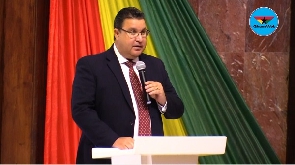 Pierre Laporte, World Bank Country Director for Ghana
Pierre Laporte, World Bank Country Director for Ghana
Data released in the first half of 2020 point to a severe global recession, according to the World Bank’s latest Global Economic Prospects June 2020.
The global composite PMI—a gauge of worldwide manufacturing and services activity—sank deep into contractionary territory to a record low of 26.5 in April 2020.
Along with the implied sharp drop in output, global trade has also contracted significantly.
The report also said global tourism and travel have been severely curtailed with international travel restricted and internal travel discouraged in most countries. So far this year, tourist arrivals declined by nearly 100 per cent among reporting countries.
Globally, the number of commercial flights is down about 70 per cent since the beginning of the year.
Global financial conditions
The report pointed out that global equity markets fell sharply as the pandemic spread across the world.
Within a week of reaching an all-time high in mid-February, the S&P 500 index in the United States experienced its fastest decline since October 1987, and stock markets in other major economies experienced declines of similar magnitude.
Commodity markets
As a result of the sharp decline of global commodity demand, the prices of most commodities have fallen steeply, particularly those used in the transport industry.
Benchmark oil prices have been most affected, with the European Brent spot price plunging by 85 per cent between late January—when the first human-to-human transmissions of the virus were announced—and its trough in late-April and the WTI price briefly trading at negative levels, before a gradual recovery in May.
The decline in oil prices in March was the largest one-month price plunge on record.
Oil demand is expected to fall by about 20 per cent in the year to the second quarter of 2020 and an unprecedented decline of 9 per cent is projected for the year as a whole.
Meanwhile, the report says countries can take steps now to rebuild from COVID-19.
It says securing core public services, getting money directly to people and maintaining the private sector will limit the harm and help prepare for recovery.
Short-term response measures to address the health emergency and secure core public services will need to be accompanied by comprehensive policies to boost long-term growth, including by improving governance and business environments, and expanding and improving the results of investment in education and public health, it said.
To make future economies more resilient, many countries will need systems that can build and retain more human and physical capital during the recovery – using policies that reflect and encourage the post-pandemic need for new types of jobs, businesses and governance systems.
The analysis has been released ahead of the June 8 issuance of the full report, which will include the Bank Group’s latest forecasts for the global economy.
“The scope and speed with which the COVID-19 pandemic and economic shutdowns have devastated the poor around the world are unprecedented in modern times. Current estimates show that 60 million people could be pushed into extreme poverty in 2020. These estimates are likely to rise further, with the reopening of advanced economies the primary determinant,” said World Bank Group President David Malpass.
Deep recessions associated with the pandemic will likely exacerbate the multi-decade slowdown in economic growth and productivity, the primary drivers of higher living standards and poverty reduction.